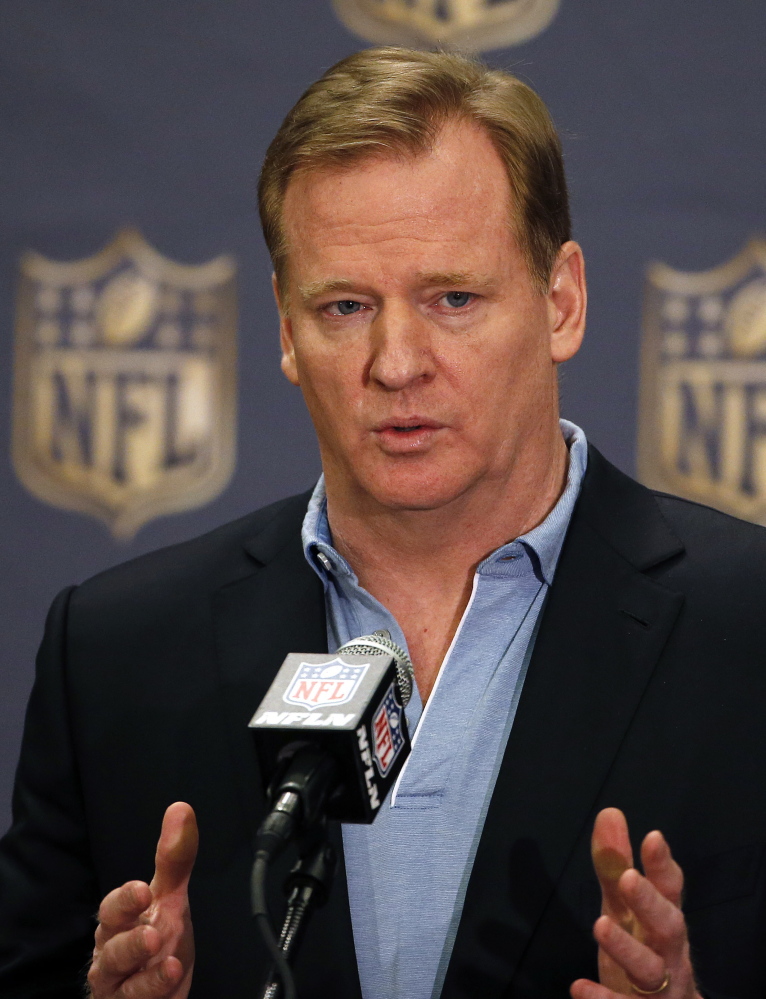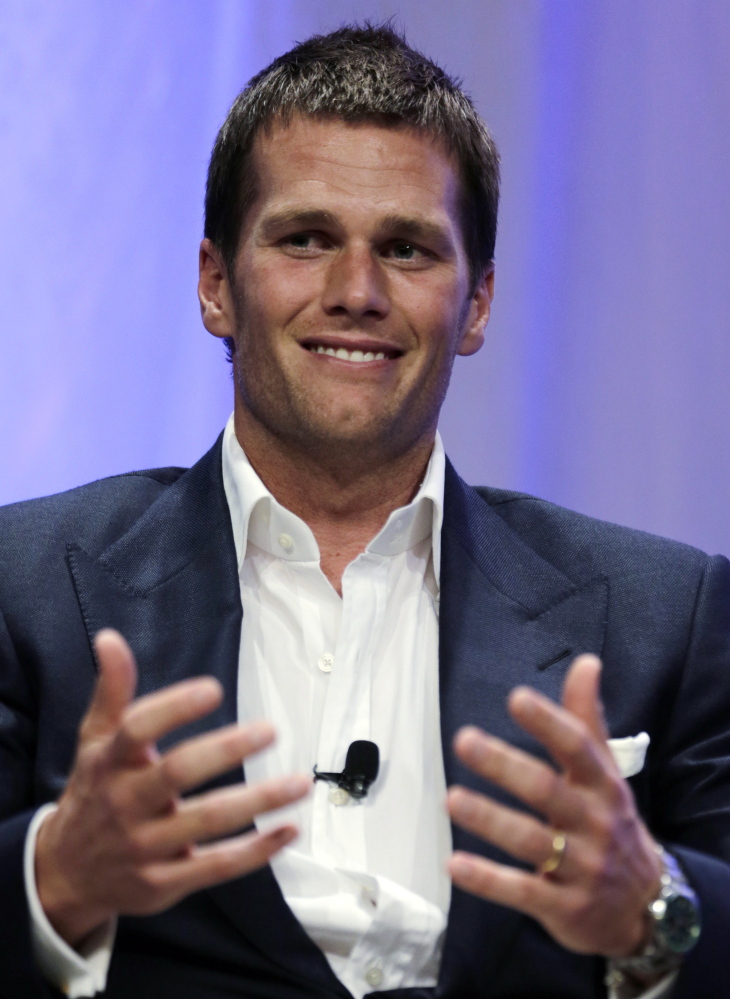The NFL and the players’ union have become so accustomed to facing one another in court that a single lawsuit wasn’t enough for them in the Tom Brady case.
Instead the league and union filed dueling lawsuits in federal courts in New York and Minnesota over Brady’s four-game suspension, which was upheld Tuesday by Commissioner Roger Goodell after he heard the appeal of the four-time Super Bowl-winning quarterback for the New England Patriots.
The league is seeking to have Goodell’s ruling confirmed, while the union and Brady are attempting to have Brady’s suspension overturned.
On Thursday, a Minnesota judge ruled the case should be heard in New York. The NFL and its players have a long history in the Minnesota courts, where players often have prevailed.
The NFL Players Association has had success in recent months contesting the suspensions of Ray Rice, Adrian Peterson and Greg Hardy. But legal experts say the union and Brady have the odds stacked against them.
“It’s an uphill battle,” said Gabriel Feldman, the director of the sports law program at Tulane University. “That’s primarily because as a general matter it is very difficult to overturn an internal arbitration decision whether the court agrees with that decision or not.”
That doesn’t mean the union cannot prevail. But it does mean that Brady and the NFLPA must do more than demonstrate Goodell’s rejection of Brady’s appeal was incorrect.
The union also signaled in its lawsuit that it intends to seek an expedited ruling or an injunction that would allow Brady to play in the Sept. 10 opener against the Pittsburgh Steelers.
“There are two battles, one to get the suspension overturned and one to get a preliminary injunction so he can play while he attempts to get the suspension overturned,” Feldman said. “They’re both uphill battles. Courts are reluctant to overturn internal arbitration decisions. It’s not whether the judge agrees or disagrees with the decision. The decision has to be shown to be arbitrary or capricious, or that the arbitrator was not impartial or there was a flawed process. To get an injunction, he’ll have to show not only that he has a likelihood of success on the merits but also that he would suffer irreparable harm.
“It’s hard to show how missing four games can’t be repaired by paying him his salary for those four games. You can try. You can argue that careers are short and those four games can’t be recovered. There are certainly grounds for review. The union has a host of arguments it can make and will make. It’s possible. But it’s a steep climb.”
Opinions vary about what the outcome is likely to be. David Cornwell, a lawyer who has represented players in a variety of cases and a former candidate for executive director of the NFLPA, said when asked about Brady’s chances of success in court: “None.”
The NFL says it properly followed the collective bargaining agreement between the league and union, which outlines the disciplinary process in such cases and, among other things, empowers Goodell or someone designated by him to hear a player’s appeal.
“It appears the process complied,” Cornwell said. “What is granted to the commissioner is absolute authority to protect the integrity of the game. It is a hard and fast rule. He’s obligated to be fair, to not be arbitrary and capricious. You have to show fraud or undue bias to overturn an arbitration. You can’t do that here.”
Cornwell said the evidence allowed Goodell to reasonably conclude the Patriots and Brady violated the sport’s competitive rules. This week’s revelation that Brady directed that his cellphone be destroyed before he met with league-appointed investigators also works against the quarterback, according to Cornwell.
“When you destroy evidence, as a matter of law, there is a presumption that the evidence would be harmful to you,” Cornwell said. “The explanation for destroying the phone does not make sense. It makes no sense to say that phone one was destroyed and phone two was not. It is reasonable to conclude that it is more likely than not they engaged in cheating.
“Since Judge Kenesaw Mountain Landis suspended players in the Black Sox scandal (of 1919), it has been well established that commissioners have the authority to act to preserve the integrity of the game. They are challenging principles that have been in place since the beginning of sports.”
Not everyone agrees. Alan Milstein, a lawyer who fought the NFL in court over Maurice Clarett’s NFL draft status, said Goodell’s argument that he acted appropriately is incorrect.
“In a case like this, there’s no way the commissioner can remove his bias from the situation,” Milstein said. “It’s his ruling, his sanction that he had to opine on and decide on. There’s no way you could argue the players bargained away bias. If they said the commissioner could be the arbiter in certain situations, the assumption is he would be the arbitrator in situations where he wasn’t already biased.”
Rice’s indefinite suspension by the NFL was overturned last year by Barbara Jones, the former federal judge appointed by Goodell to hear that appeal. The union went to the Minnesota court after Peterson’s suspension was upheld by arbitrator Harold Henderson and prevailed before U.S. District Judge David Doty, who sent the case back to the NFL for further proceedings. Henderson also heard Hardy’s appeal and reduced that suspension from 10 to four games.
Those were cases under the personal conduct policy; Brady’s is not. Will the union’s winning streak continue nevertheless? Milstein is in the minority that believes either court will vacate Brady’s suspension.
“It’s very difficult to overturn the arbitration,” Milstein said. “It’s not like you can say the facts didn’t support the ruling. You can’t appeal an arbitration ruling the way you can a court’s decision. But the grounds to overturn an arbitration is, the main ground is it wasn’t fair, that it offends the principles of justice. The main thing anybody could argue in this case is the commissioner shouldn’t have been the arbiter since it was the commissioner’s own ruling that he was arbitrating.”
Copy the Story LinkSend questions/comments to the editors.




Success. Please wait for the page to reload. If the page does not reload within 5 seconds, please refresh the page.
Enter your email and password to access comments.
Hi, to comment on stories you must . This profile is in addition to your subscription and website login.
Already have a commenting profile? .
Invalid username/password.
Please check your email to confirm and complete your registration.
Only subscribers are eligible to post comments. Please subscribe or login first for digital access. Here’s why.
Use the form below to reset your password. When you've submitted your account email, we will send an email with a reset code.